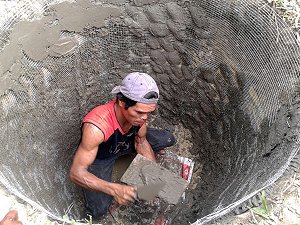Yolanda-hit
villages declared as first 'Zero Open Defecation' barangays in Leyte
By Save the Children
September 27, 2014
WESTERN LEYTE, Philippines –
Seven Yolanda-hit barangays across 3 municipalities around Ormoc have
been declared as first in the entire Leyte province to eradicate
defecation in public – a practice known to cause contamination of
water sources and diarrheal diseases.
 The declaration came after
an authorized government body, including hygiene specialists and
international organizations, certified the remote barangays of Bulak,
Masaba, and San Dionesio in Matag-ob town; Payao in Villaba town; and
San Ignacio, Santa Domingo and Libertad in Kananga town as the first
Zero Open Defecation (ZOD) barangays in the province of Leyte. To
achieve ZOD status, each household in a barangay should have access to
toilet and water supply. The recognition was a big feat given that 70%
of people in these communities did not have access to toilets
immediately after the super typhoon.
The declaration came after
an authorized government body, including hygiene specialists and
international organizations, certified the remote barangays of Bulak,
Masaba, and San Dionesio in Matag-ob town; Payao in Villaba town; and
San Ignacio, Santa Domingo and Libertad in Kananga town as the first
Zero Open Defecation (ZOD) barangays in the province of Leyte. To
achieve ZOD status, each household in a barangay should have access to
toilet and water supply. The recognition was a big feat given that 70%
of people in these communities did not have access to toilets
immediately after the super typhoon.
Western Leyte has areas with
some of the highest rates of open defecation in the country even
before 'Yolanda'. In the immediate aftermath, the Water, Sanitation
and Hygiene (WASH) cluster estimated that around 65% of areas in the
region did not have access to toilets.
Save the Children has been
providing remote and vulnerable areas, including the ZOD-certified
barangays, with construction materials and trainings to build and
repair toilets as part of its comprehensive 'Yolanda' response. To
date, Save the Children has provided construction materials for over
6,525 toilets in 32 barangays and plans to help build 3,475 more
across 47 barangays in 2014.
"Save the Children knows
that the practice of open defecation poses great health risks to the
disaster-affected communities, especially children. By providing
communities with toilets and clean water supply, especially those in
remote and vulnerable areas, we can help protect children and adults
from infectious diseases." said Tom Howells, Save the Children's Field
Manager in Western Leyte Office.
According to WHO, diarrheal
disease is the second leading cause of death in children under five
years old, and is responsible for killing around 760,000 children
every year. WHO added that the disease can last several days, and
eventually dehydrates the body. The disease is common particularly
among children and elderly.
Save the Children
recognizes, however, that building toilets and repairing water lines
alone may not fully address water and sanitation problems in Western
Leyte. In response, the organization launched a province-wide campaign
to educate people on the health risks of poor hygiene and sanitation.
At the household level, Save the Children consulted with and fully
involved communities and local officials in the design and
construction of toilets and water facilities.
"It is not enough that we
provide communities with construction materials. The communities that
achieved zero open defecation were successful because they now see the
importance of proper hygiene and sanitation. Without proper
consultation with and full involvement of the community and the local
government, these projects may not succeed in the long-term", says
Reggie Aquino, Save the Children's Program Development and Quality
Manager in Western Leyte Office.
Save the Children continues
to work closely with the local government, the Department of Health
and humanitarian organizations in restoring water supply systems to
provide clean water; engaging schools in hygiene promotion sessions
and training communities in reconstructing their toilets. Save the
Children's comprehensive response in the region includes providing
communities with cash transfers, community grants for food, security
and livelihoods and shelter assistance. The children's organization is
also undertaking repairs of schools, district health stations,
provision of medicines and establishment of Child Friendly Spaces.